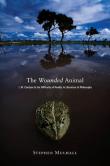 7943201415290510761.png
7943201415290510761.png
 The Wounded Animal: J. M. Coetzee and the Difficulty of Reality in Literature and Philosophy
single work
The Wounded Animal: J. M. Coetzee and the Difficulty of Reality in Literature and Philosophy
single work
 7943201415290510761.png
7943201415290510761.png
 The Wounded Animal: J. M. Coetzee and the Difficulty of Reality in Literature and Philosophy
single work
The Wounded Animal: J. M. Coetzee and the Difficulty of Reality in Literature and Philosophy
single work
'In 1997, the Nobel Prize-winning novelist J. M. Coetzee, invited to Princeton University to lecture on the moral status of animals, read a work of fiction about an eminent novelist, Elizabeth Costello, invited to lecture on the moral status of animals at an American college. Coetzee's lectures were published in 1999 as The Lives of Animals, and reappeared in 2003 as part of his novel Elizabeth Costello; and both lectures and novel have attracted the critical attention of a number of influential philosophers–including Peter Singer, Cora Diamond, Stanley Cavell, and John McDowell.
'In The Wounded Animal, Stephen Mulhall closely examines Coetzee's writings about Costello, and the ways in which philosophers have responded to them, focusing in particular on their powerful presentation of both literature and philosophy as seeking, and failing, to represent reality–in part because of reality's resistance to such projects of understanding, but also because of philosophy's unwillingness to learn from literature how best to acknowledge that resistance. In so doing, Mulhall is led to consider the relations among reason, language, and the imagination, as well as more specific ethical issues concerning the moral status of animals, the meaning of mortality, the nature of evil, and the demands of religion. The ancient quarrel between philosophy and literature here displays undiminished vigor and renewed significance.' (Publisher's summary)
Table of Contents:
ABBREVIATIONS ix
CHAPTER ONE: Introduction: The Ancient Quarrel 1
PART ONE: THE LIVES OF ANIMALS 19
CHAPTER TWO: Elizabeth Costello's Lecture: Stories, Thought-Experiments, and Literal-Mindedness 21
CHAPTER THREE: Elizabeth Costello's Lecture: Three Philosophers and a Number of Apes 36
CHAPTER FOUR: Food for Thought: Two Symposia 58
CHAPTER FIVE: Food for Thought: A Third Symposium 69
CHAPTER SIX: Food for Thought: An Uninvited Guest? 95
CHAPTER SEVEN: Elizabeth Costello's Seminar: Two Poets and a Novelist 110
CHAPTER EIGHT: Elizabeth Costello's Seminar: Primatology and Animal Training, Philosophy and Literary Theory 122
PART TWO: ELIZABETH COSTELLO 137
CHAPTER NINE: Realism, Modernism, and the Novel 139
CHAPTER TEN: Costello's Realist Modernism, and Coetzee's 162
CHAPTER ELEVEN: The Body in Africa 184
CHAPTER TWELVE: Evil as Obscenity 203
CHAPTER THIRTEEN: Two Embodiments of the Kafkaesque 214
CHAPTER FOURTEEN: Conclusion: Three Postscripts 231
BIBLIOGRAPHY 253
INDEX 257